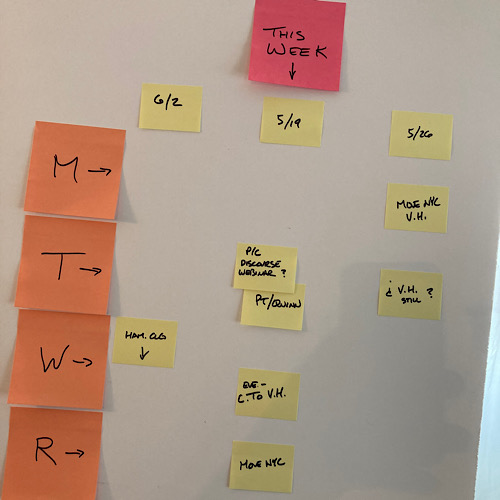Something organized people don’t often talk about is how much time they spend organizing their time.
~ Cal Newport from, Spend More Time Managing Your Time – Cal Newport
Guilty as charged, Your Honor! So today, something a little lighter than usual—I think?—with a few snapshots of how much time I spend organizing my time.
It is an exceedingly rare morning that I don’t spend about half an hour planning out the day. This little block of time begins with “surfacing:” Ducking into all the many online mediums where I am present, and—this is very hard—not engaging, but skimming over things to see what rises to a level of getting my attention today. Many productivity sources and guides suggest doing this at night, at the end of your day, but that does not work for me.
Every Monday I take an “administrative day”—the entire day. I stuff the day full of all the random things of life. Any errands to run, laundry, lawn mowing if I can, bookkeeping (literal banking and accounting and such). I do my best to resist doing any real work. I do anything like changing the bed linen, or high dusting the house, or stacking firewood, or changing a flat tire on my bike, …anything that I would consider “not important” …except of course if I never got around to doing it, then it’s a critical disaster …that’s “administrative day” stuff. This isn’t exactly time spent on organizing, but still.
I use sophisticated planning/project-tracking software, called OmniFocus, to manage a lot of stuff. (Things from recurring daily things, to true projects that have many steps and milestones and due dates.) Every two weeks—on an Admin Day!—I spend about an hour just going through every nook and cranny of my OmniFocus. (If you’ve read Getting Things Done, this is part of the review process.) I tend to ruthlessly delete stuff in an effort to combat my incessant tendency to take new things on.
At least once a month—again, on an Admin Day—I do the same sort of “look through every nook and cranny” review of the Basecamp system that is used for one of the companies I’m part of. Sometimes I can do that in 5 minutes, sometimes I’ll spend hours on it.
At the least organized end of the spectrum, (yes, my time spent managing my time comes in a spectrum of how organized it is,) I often—maybe twice per month this happens—will go off, (as in “off the deep end,”) and outline some project that I’m considering doing. I’ll whip out my favorite outliner, OmniOutliner, and do a brain dump of some project. This can take from 5 minutes to an hour or more depending on what I’m thinking about. Quite often, I’ll then simply set aside some awesome idea that I don’t have the time to execute, or the resources to have it done under my direction. I used to think this was wasted time, but it is the only way I can get things off my mind: When it pops up later, I either think, “I already did all the thinking,” or I go back to the outline and tinker some more. (What remains, forever, is just to squash the recurring lizard-brain fear of missing out by not executing the project.)
So let’s see, how much time is all of that combined? I’m awake 16 hours a day, but realistically, only half that time could ever be used to some specific end. So 8 hours a day of “self-directable life”. 1 out of 7 days is an Admin Day… 1/7 ~ 0.1428… The rest of that stuff might—maaaaaaybe, but probably not—eat a second day’s worth of each week . . . 2/7 ~ 0.2857…
So in response to how much time do I spend managing my time? I’ll say:
15 to 30% of my entire available life.
ɕ
